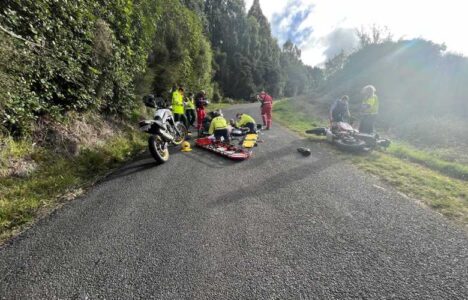Juliet started working life as an outdoor education instructor. After learning some first aid for the job she decided she wanted to do more than “band aids and stuff”. That’s when her journey to becoming a paramedic, and now a critical care paramedic, began.
Here, Juliet braces herself for 10 quick-fire questions on life on the job!
How long have you been working on the rescue helicopter?
It’s been about 10 years. I was working on the road ambulances for about a decade before that.
What’s the most memorable job you’ve had?
Most recently it was probably the pilot who ditched his plane in Tasman Bay. We were on another job at Nelson Hospital when we heard it going down. I had some water gear quickly dropped to the Hospital and then we’re off. It took us about five minutes to spot him; his plane had sunk so he was there by himself, bobbing around. He’d done everything right and was wearing a highlighter yellow life jacket.
When I was winched down to him, I had to get my knife out and slice his life jacket so I could physically get him into the winch and then up into the helicopter.
What’s the hardest part of the job?
It can be really hard seeing other people’s grief. We get used to seeing tough situations but for a family, that’s their own story and that can be hard to watch.
It’s also hard when we’re trying to get to a patient and we have to make a crew decision to turn back due to weather. It’s an easy decision because it’s about safety, but you know someone needs you so it’s not easy, if you know what I mean.
What are your favourite types of jobs?
I’d say the backcountry PLB (personal locator beacon) jobs. I quite like those because you see beautiful country, you go and help someone out and sometimes, the patient is not that severely injured – just stuck. And they are so thankful and happy when we arrive! I also like the big jobs that challenge us and require us to really utilise all our skills.
Do you ever get used to hanging off the side of a helicopter?
Yeah, you do – and I like it. You do have heavy moments where there might be a but of rough weather which makes it more challenging, but no, it’s cool.
What’s one thing that people would be surprised about the job?
I think people don’t realise when we get winched down, the crew fly away and you’re there by yourself. Sometimes you have to make pretty big decisions on your own and it can be really busy.
What’s your advice to someone who wants to be a rescue helicopter paramedic?
Invest in yourself, build a foundation of strong, outdoor skills and become a well-rounded person. You don’t have to be the best at everything, but you need to be a really good team player.
And I would sign up and become a volunteer with St John, because most people come to us from a road ambulance background.
What’s your go to snack when you’re running between jobs?
Some quick, easy to grab and full a good energy – a Crafty Weka bar is one of my favourites.
How do you keep yourself mentally fit for the job?
You have to separate yourself from the patient and work, but if there is a job that revisits me a bit rather than trying to forget it, I’ll take time to consciously acknowledge it. It’s like saying to yourself ‘yeah, that was a shitty job, and those people will have consequences from that forever.’ I acknowledge the sadness, and then it’s easier to move on.
What’s one thing people may not know about you?
I have a twin sister and together we’re taking on the Back to Base challenge. We’re The Fitzie Twins so look us up and give us your support!
You can support The Fitzie Twins’ Back to Base challenge at The Fitzie Twins • Back to Base






